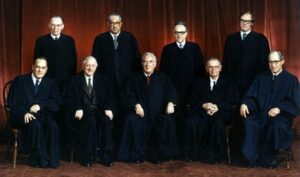
Roe v. Wade is arguably the most controversial and well-known case that has come before the Supreme Court in recent years. Argued in 1971 (and later re-argued and decided in 1973), the controversial Roe v. Wade case dealt with a woman’s right to privacy with regard to having the right to obtain an abortion.
Norma McCorvey, the petitioner in this case, claimed to have been raped and subsequently become pregnant as a result. Upon visiting her doctor, he refused to perform the abortion that she requested because of a Texas law that made abortion illegal except if it was necessary to preserve the life of the mother. Because the life of the mother was not being put in immediate danger, it was illegal for the doctor to perform the abortion.
McCorvey challenged the Texas law, and her case rose all the way up to the Supreme Court in the case of Roe v. Wade, where it proved to be a very difficult and controversial decision. the argument of McCorvey, under the pseudonym Jane Roe, noted that the Texas statute infringed on a woman’s fundamental personal right to privacy. Although the Constitution has never explicitly named that U.S. citizens have a right to privacy, various Supreme Court justices have acknowledged that this right does indeed exist in the “penumbras” of the Constitution, and have found evidence supporting this right in the first, third, fourth, fifth, and ninth amendments. Roe additionally claimed that the Texas law is not rationally related to any legitimate health concern, any legitimate interest in regulating private sexual conduct, or any interest in protecting human life.
The respondents in this case, which represent the views of what today is known as the “pro-life” movement, disagreed with the arguments held by Roe. Instead, they argued that the Constitution does not guarantee women the right to an abortion, and that personal and marital privacy are not fundamental nor absolute rights. Finally, Wade held that life begins at conception, and that the State has a compelling interest in preserving the life of the fetus even if it abridges some privacy right of the mother.
The Court had a difficult time deciding this case, but in the end, it ruled in favor of Roe in a 7-2 decision. The Court stated, “This right of privacy, whether it be founded in the Fourteenth Amendment’s concept of personal liberty and restrictions upon state action, as we feel it is, or, as the District Court determined, in the Ninth Amendment’s reservation of rights to the people, is broad enough to encompass a woman’s decision whether or not to terminate her pregnancy.” The Court did not directly address the question of where life begins, but noted that although the Constitution never explicitly defines a person, the term is always used post-natal.
Despite the final decision, the Court still recognized the importance of the rights of both the mother and the unborn fetus, stating in its opinion, “The state does have an important and legitimate interest in preserving and protecting the health of the pregnant woman, whether she be a resident of the State or a non-resident who seeks medical consultation and treatment there, and that it still has another important and legitimate interest in protecting the potentiality of human life. These interests are separate and distinct. Each grows in substantiality as the woman approaches term and at a point during pregnancy, each become compelling.” In order to recognize the importance of these two interests, the Court set up a trimester framework outlining when during a woman’s pregnancy obtaining an abortion is protected by the Constitution and the right to privacy. However, this framework has since been abandoned in later cases.
To this day, the topic of abortion remains intensely divisive, and the decision has sparked further activism on both sides of the issue, including the Right to Life March that occurs annually in Washington, D.C. Many critics cite that the Court engaged in judicial activism in this case, and that it stepped far beyond its powers and into the realm of policy-making–a power delegated strictly to the legislative branch of government. Interestingly enough, Norma McCorvey, the face of the pro-choice side in the Roe v. Wade case, has since become a supporter of the pro-life movement.
To learn more and to hear the actual oral arguments from the case, click here.
Back to Crime Library
|
|
|
